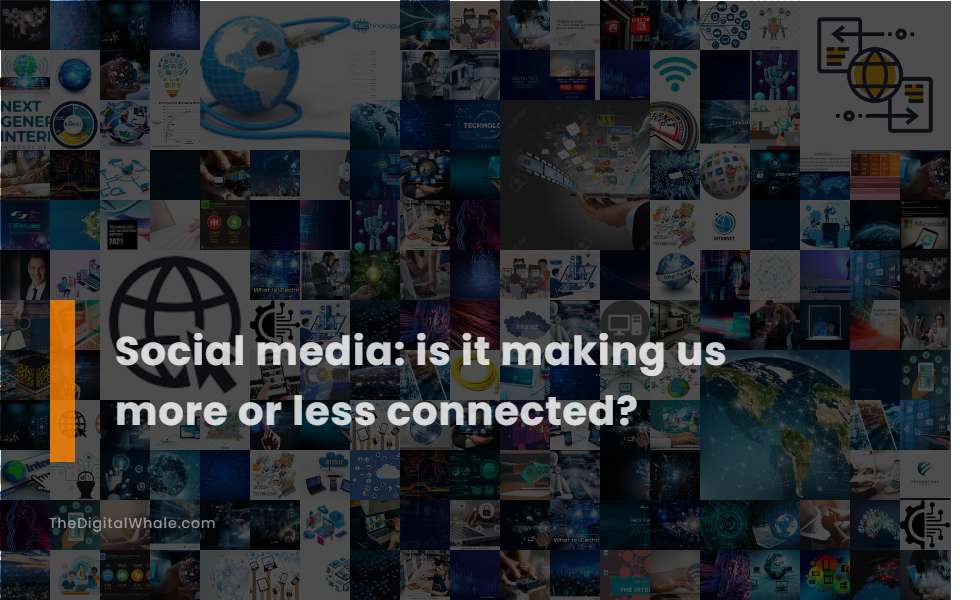Social Media: Is It Making Us More Or Less Connected?
What mental effect does social media have on people? How do social media platforms help us connect with each other? Let's find out more about Social Media: Is It Making Us More Or Less Connected?.

Enhances long-distance relationships through constant communication and shared experiences.
Social media enhances long-distance relationships by providing constant communication and the ability to virtually experience events in each other's lives, making it easier for couples to maintain a strong connection despite physical distance. The platform enables partners to share moments and emotions instantly, bridging the gap that once separated them. For an in-depth exploration of this dynamic, the insightful article on Marquette Wire delves into how these digital tools transform long-distance romances into enduring bonds.
Expands dating horizons by connecting individuals beyond their immediate circles.
Social media and online dating apps are expanding dating horizons by connecting individuals beyond their immediate circles, facilitating relationships between people who might not have met otherwise, such as highly educated women and less educated men. Platforms like Tinder are instrumental in enabling those with specific goals, like starting a family, to find compatible partners more easily.
Strengthens existing relationships through instant sharing and ongoing conversations.
Social media plays a pivotal role in strengthening existing relationships by enabling instant sharing and ongoing conversations. It bridges geographical gaps, fostering intimacy through constant connection and shared experiences. By providing frequent touchpoints, real-time updates, and shared experiences, social media allows friends to maintain and deepen their connections despite physical distance. This powerful tool enhances existing bonds, enabling us to stay connected with loved ones no matter where they are. For more perspective on this topic, visit Mind Body Counseling Reno to explore how social media impacts relationships.
Provides global connectivity for family and friends worldwide.
Social media has significantly enhanced global connectivity, allowing people to communicate with family and friends worldwide seamlessly, regardless of geographical distances. It plays a crucial role in facilitating the maintenance and strengthening of personal ties across different nations. By harnessing the power of platforms such as those discussed on LSI Media, individuals and communities are more interconnected than ever, fostering a more cohesive global interaction landscape.
Facilitates real-time video chats to feel more connected.
Real-time video chats in social media apps enhance connectivity by allowing users to engage in face-to-face interactions, live streaming, and immediate feedback, fostering a sense of belonging and community despite geographical distances. These interactions enable users to stay connected with family and friends globally, maintaining relationships through frequent and meaningful interactions that feel as intimate as in-person connections. For more insights, explore the comprehensive article on Real-Time Communication in these platforms, which highlights their positive impact on digital life.
Related:
What are some dangers of artificial intelligence? Should we be scared of AI? Let's find out more about Should We Be Worried About Ai and Machine Learning?.
Can lead to less quality in-person time with loved ones.
Social media can lead to less quality in-person time with loved ones, as excessive use may result in decreased relationship satisfaction, increased conflict, and a substitution of face-to-face interactions with online communications. According to Medical News Today, this shift from real-life interactions to digital engagements can have significant implications on personal relationships, impacting emotional connectivity and overall relationship quality. It is important to find a balance between online presence and in-person interactions to maintain healthy and fulfilling relationships.
May create conflict and reduce relationship satisfaction if used excessively.
Excessive social media use can create conflict and reduce relationship satisfaction by fostering unrealistic expectations, digital jealousy, and surveillance. This behavior often erodes trust and leads to unnecessary conflicts within romantic relationships. Increased activity on platforms like Instagram can further exacerbate this issue, resulting in negative outcomes and may even trigger social media addiction. These dynamics are explored in detail in discussions around How Social Media Affects Relationships, highlighting the adverse impact on relationship dynamics and emphasizing the importance of maintaining a healthy balance in social media consumption.
Increases exposure to cyberbullying, social anxiety, and depression.
Social media increases exposure to cyberbullying, which is linked to higher severity of depression, PTSD, anxiety, and other mental health issues, particularly among adolescents who spend more time online. According to a study published by the University of Miami, the mental health challenges associated with cyberbullying are becoming a growing concern due to the increasing time young people dedicate to online activities.
Fosters a sense of disconnection by showing only the positive aspects of lives.
Social media often fosters a sense of disconnection by presenting only the positive aspects of others' lives, leading to feelings of isolation, loneliness, and a detachment from reality as users compare their lives to the idealized online personas of others. The constant barrage of perfectly curated images and status updates can lead to feelings of inadequacy and exclusion, exacerbating loneliness and low self-esteem. This phenomenon is discussed further in The Great Disconnect, highlighting how these platforms, while intended to connect, often leave individuals feeling left out of the seemingly perfect lives of their online connections.
Can be addictive and affect mental health through dopamine-driven interactions.
Social media can be highly addictive and negatively impact mental health through dopamine-driven interactions, where likes, shares, and other forms of social feedback trigger the brain's reward system, leading to increased use and potential issues such as depression, anxiety, and loneliness. For more information, visit Addiction Center for a detailed exploration of Social Media Addiction.
Related:
What are the ethical and sociological implications of big data and AI? When it comes to data ethics, what are the six methods you incorporate into your business? Let's find out more about Big Data: What Are the Ethical Implications?.
